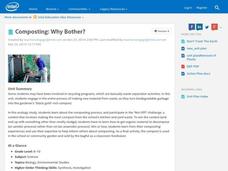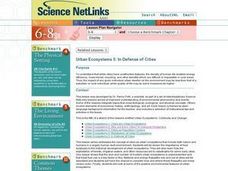Intel
Composting: Why Bother?
The first STEM lesson in a group of 10 explores composting. After discussing how to make a better tomorrow, classes are challenged to track garbage in their communities, visit a local waste management facility, and conduct a survey about...
Curated OER
Urban Ecosystems 5: In Defense Of Cities
Students explain that while cities have unattractive features, the density of human life enables energy efficiency, mass transit, recycling, and other benefits which are difficult or impossible in rural areas. This is the fifth in an...
Purdue University
Design of an Earthen Dam for a Lafayette Neighborhood
How do dams support bodies of water? Scholars engage in a hands-on STEM activity where they design, build, and test dams to learn about bodies of water and how humans use natural resources. They learn how criteria and constraints affect...
Curated OER
Automobile-Accident Reconstruction
Students investigate an accident and relate it to math. In this trigonometry instructional activity, students measure the accident scene, the friction produced, and the speed from the skid marks. They create a poster of their findings.
Curated OER
Beads, Balls, and Beakers
Students analyze the amount of space required to pack round objects. In this geometry instructional activity, students practice using space economically by practicing packing spheres into beakers. They then translate this concept to...
Curated OER
You Need How Much Food When? Where?
Ninth graders explore how human activities shape the earth's surface. In this awareness lesson, 9th graders create pictographs showing the relations of food, people, land, and resources. Students complete worksheet.
Curated OER
Aquatic Science and IPC
Students explain the importance of water in our daily lives. In this aquatic science lesson, students identify different ways to purify water and make it potable. They design and construct a water filter based on researched information.








